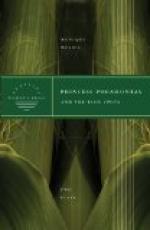She paused again to let her words sink in. Mistress Lettice wished no harm to Pocahontas. Indeed she loved her dearly and desired above all things to see her happy. And she believed that Rolfe as her husband would make her happy. Smith, if not indeed dead, was not likely to return to Jamestown, and therefore he might better be dead as far as Pocahontas was concerned, she thought. The worthy dame had picked her audience, which was composed chiefly of men who were well known to be enemies of Smith, who would not hold back from a slight untruth when they felt sure that it would help to secure safety from Indian attacks, which were proving so disastrous to their small community.
“We are mightily amazed at thy words. Mistress Lettice,” said one of her guests at last; “and in truth it hath taken thy woman’s eyes to see what was going on under our very noses and thy woman’s tongue to show us the importance of Master Rolfe’s courtship to the welfare of the Colony. If so small a thing as what thou hast suggested is all that stands between us and the confirmation of this marriage, why, that is as easily disposed of as this flagon of thy brother’s sack which I drink to thy health.”
He put the emptied cup upon the table and the company rose to go, now that both business and pleasure were finished. They did not need much talk about what they intended to do.
As they were bidding Mistress Lettice farewell, with many compliments on her housewifery and her zeal for the settlement, Pocahontas appeared at the door. She had been, as Mistress Lettice well knew, away with Rolfe, showing him how her people planted tobacco, since he had become much interested in this weed—being the first in the Colony to grow it—and had expressed what seemed to his neighbors ridiculous hopes of future wealth to be derived from the sale of tobacco in England.
Pocahontas looked about her with eagerness, and while the men doffed their hats, she asked:
“What hath happened, sirs, that so many come to visit us at one time? It is like our councils when the old chiefs debate about the council fires.”
No one was anxious to be the first to answer, but since some reply was necessary, the councilor who had testified to Mistress Lettice’s insight said slowly and solemnly:
“We have come. Princess, to condole with thee at the death of thy friend, Captain John Smith.”
“Dead!” cried Pocahontas. “He is dead?”
And the men, who wished not to burden their consciences with a spoken lie, all nodded assent. They thought to see the girl burst into tears or run away, as they had more than once seen her do when she was displeased; but instead she stood still, her face as motionless as a statue’s. They were glad to slip away with muttered words of sympathy.
Nor when they were gone did Mistress Lettice’s curious and affectionate eyes witness any sign of sorrow.
“I own myself wrong,” she said that night to her husband; “she careth naught for the Captain. I wept all day last Michaelmas when my old dog died.”




